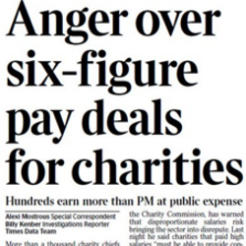An investigation by the Times into executive pay at 1,000 of the highest-earning charities has shown that 1,080 executives at 390 organisations receive salaries of at least £100,000 a year.
The piece, which appeared on the front page of the newspaper this morning, has highlighted some charities where the pay of the top earner was “out of proportion to their peers”. It also showed examples of “relatively small charities” who hand out “huge salaries”.
Caudwell Children, which had an income of £6.2m last year, paid its top employee more than £230,000. The paper points out that last year Save the Children’s chief executive was criticised for earning the same salary, “despite that charity receiving more than 100 times the income”.
The Times does suggest that some charity chief executives at larger organisations are deserving of higher salaries. Later on in its ‘leading articles’ section, the paper writes that Save the Children is a “complex organisation pulling in £650m annually and operating in more than 100 countries”. It adds that “its chief executive earns a generous £240,000 but the figure is not disproportionate to the role".
Caudwell Children was founded by John Caudwell, co-founder of mobile phone retailer Phones4u, in 1999. In response to questions about the salary, a charity spokesman refused to say whether the recipient was Trudi Beswick, the charity’s chief executive.
He also declined to explain the charity’s remuneration policy to the Times, other than to say that “management costs were covered by a ‘private benefactor’ believed to be Mr Caudwell himself”.
The Times said that it “analysed salary data from the top 1,000 charities by income, excluding independent schools, trade associations, universities, quangos, housing associations and NHS-run charities”.
It said that the findings suggest that “many charities are acting contrary to guidelines on executive pay developed by the National Council of Voluntary Organisations”.
Martyn Lewis, chair of NCVO, expressed concerns that some of the charities profiled in the newspaper are “spending substantially more than normal on very large salaries”.
He said: “Britain’s best-loved charities are serious, professional organisations responsible for raising and prudently spending hundreds of millions a year on their good work. For an average household name charity, less than 1 per cent of its spending goes on senior staff pay, which is a sensible amount in order to ensure the charity is well-run and effective. Their executive salaries are typically much smaller than for comparable roles in other sectors.
“But some of the organisations profiled here are spending substantially more than normal on very large salaries. Although what they pay is a decision for their trustees, it is incumbent on them to set out clearly and publicly how they have arrived at these figures.
"They may have special circumstances – if so, they need to explain what these are. Responsible charities are happy to be transparent, and understand that charitable registration is a privilege, not a right.”
Theatre Royal Bath was also featured in the Times for paying its artistic director between £340,000 and £350,000 last year, which the paper claims is “far more than his peers at much larger theatres”. Danny Moar was the tenth most highly paid employee of 1,000 charities analysed by the Times.
A spokesman from the charity told the Times that Moar’s salary last year “primarily comprised of bonus payments for two productions that went to the West End and his salary this year was less than £140,000”.
WomanCare Global, a reproductive health charity that is based in the US but registered in the UK, was revealed to have spent a fifth of its £6.5m income last year, which included £1.9m in grants, on six-figure salaries. The charity told the Times that it would not comment on any individual’s remuneration,
A spokeswoman said: "The board of WomanCare Global International takes the remuneration of its executives very seriously and regularly reviews staff remuneration levels having regard to appropriate factors and advice. We are confident that we have the appropriate management team and remuneration policies in place to meet our organizational objectives."
St Andrew’s Healthcare, Britain’s largest mental healthcare provider, was revealed to pay the highest salary of the 1,000 charities. Its outgoing chief executive Philip Sugarman, received £751,000 last year including a £389,000 payment in lieu of notice.
Charity Commission comments
William Shawcross, chair of the Charity Commission, said: “The public care deeply about their donations being applied as directly as possible to the end cause. It is vital that trustees consider the impact their spending decisions might have on public trust and confidence.
“The responsibility for agreeing staff salaries and explaining these decisions always lies with charity trustees. Sometimes, these salaries will seem very high to the ordinary donor or supporter. Charities that pay such high salaries must be able to provide convincing explanations for their decisions, or will risk losing public trust.”
The Times said: “At their best, Britain’s charities are a great credit to the country. At their worst they discredit each other and abuse the taxpayer. They must be kept at their best.”
One of the Times' journalists, Alexi Mostrous, was the same journalist who first covered the Cup Trust scandal in 2013.
St Andrew's Healthcare response
A spokesperson for St Andrew's Healthcare sent a response from the charity.
"As the CEO of a major mental healthcare provider, Gil Baldwin is responsible for more than 4,000 staff and over 1,000 patients per year with very complex mental illnesses. His salary in 2014/15, as reported in our annual accounts for the year ending 31 March, was £226,000.
"This was independently benchmarked at the time of his appointment and is very much in line with salaries for other healthcare CEOs in the UK."
Caudwell Children and Theatre Royal Bath were contacted by Civil Society News for further comment, but had not come back by the time of publication.









